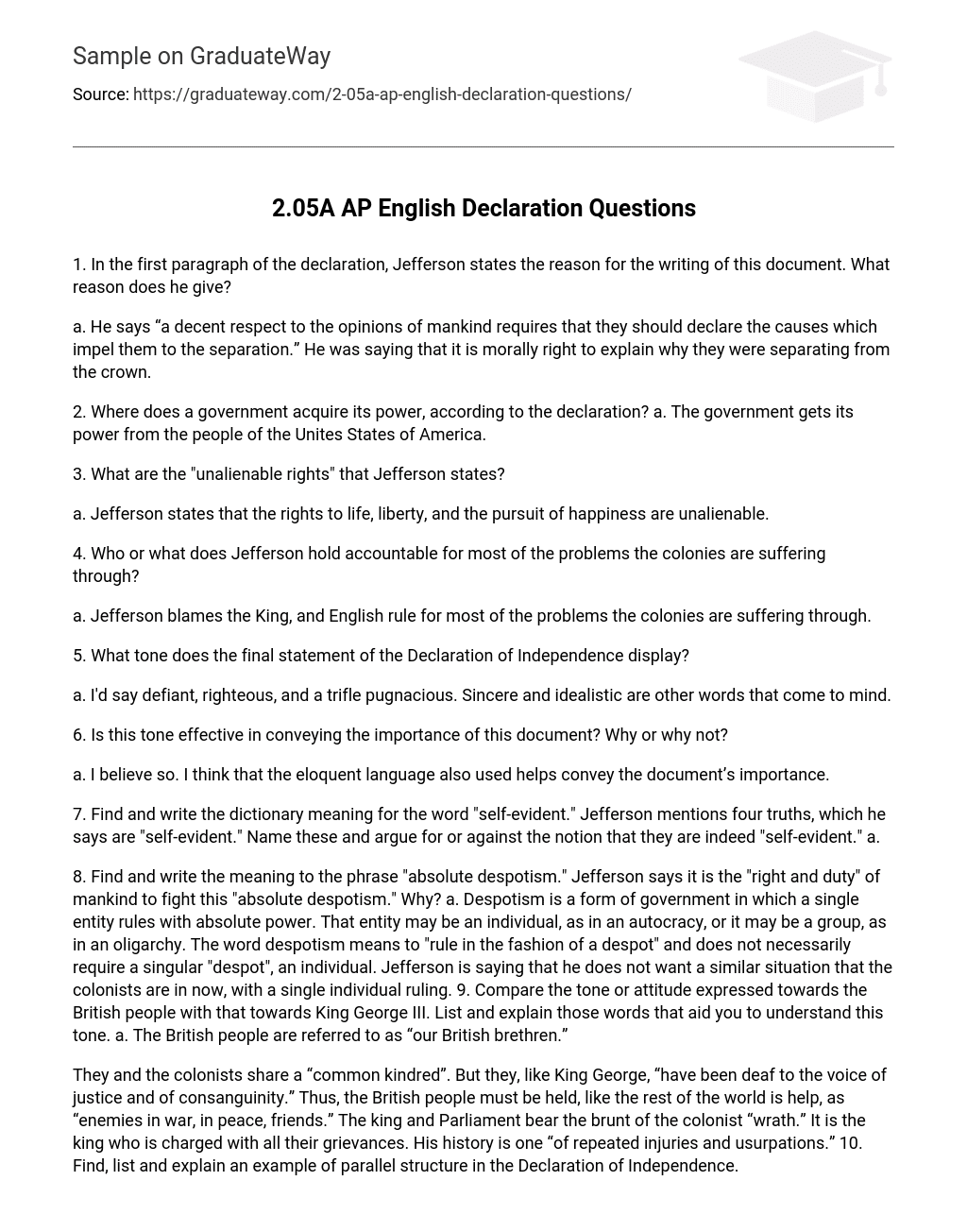1. In the first paragraph of the declaration, Jefferson states the reason for the writing of this document. What reason does he give?
a. He says “a decent respect to the opinions of mankind requires that they should declare the causes which impel them to the separation.” He was saying that it is morally right to explain why they were separating from the crown.
2. Where does a government acquire its power, according to the declaration? a. The government gets its power from the people of the Unites States of America.
3. What are the “unalienable rights” that Jefferson states?
a. Jefferson states that the rights to life, liberty, and the pursuit of happiness are unalienable.
4. Who or what does Jefferson hold accountable for most of the problems the colonies are suffering through?
a. Jefferson blames the King, and English rule for most of the problems the colonies are suffering through.
5. What tone does the final statement of the Declaration of Independence display?
a. I’d say defiant, righteous, and a trifle pugnacious. Sincere and idealistic are other words that come to mind.
6. Is this tone effective in conveying the importance of this document? Why or why not?
a. I believe so. I think that the eloquent language also used helps convey the document’s importance.
7. Find and write the dictionary meaning for the word “self-evident.” Jefferson mentions four truths, which he says are “self-evident.” Name these and argue for or against the notion that they are indeed “self-evident.” a.
8. Find and write the meaning to the phrase “absolute despotism.” Jefferson says it is the “right and duty” of mankind to fight this “absolute despotism.” Why? a. Despotism is a form of government in which a single entity rules with absolute power. That entity may be an individual, as in an autocracy, or it may be a group, as in an oligarchy. The word despotism means to “rule in the fashion of a despot” and does not necessarily require a singular “despot”, an individual. Jefferson is saying that he does not want a similar situation that the colonists are in now, with a single individual ruling. 9. Compare the tone or attitude expressed towards the British people with that towards King George III. List and explain those words that aid you to understand this tone. a. The British people are referred to as “our British brethren.”
They and the colonists share a “common kindred”. But they, like King George, “have been deaf to the voice of justice and of consanguinity.” Thus, the British people must be held, like the rest of the world is help, as “enemies in war, in peace, friends.” The king and Parliament bear the brunt of the colonist “wrath.” It is the king who is charged with all their grievances. His history is one “of repeated injuries and usurpations.” 10. Find, list and explain an example of parallel structure in the Declaration of Independence. a. We hold these Truths to be self-evident,
-that all Men are created equal,
-that they are endowed by their Creator with certain unalienable Rights, -that among these are Life, Liberty and the Pursuit of Happiness– -That to secure these Rights, Governments are instituted among Men, deriving their just Powers from the Consent of the Governed, -that whenever any Form of Government becomes destructive of these Ends, it is the Right of the People to alter or to abolish it….
This parallel structure is used by Jefferson to make clear which truths are held to be self-evident.
11. Most often, well-chosen words and a logical, clear style help a writer to succeed at persuasion. But, if you are dealing with a mature audience, words alone may not always make your case. Evidence is required to prove your case. Jefferson uses concrete details to prove his argument against King George. If you were reading this as an American colonist, which of these details or reasons would be the most persuasive to you?
a. For depriving us in many cases, of the benefits of Trial by Jury. This would be the most angering mark against King George if I was an American colonist. 12. While listing the reasons, Jefferson changes the opening word in his paragraphs from “He” to “For.” What is the purpose of this shift? a. “He” refers to King George III.
“For” is only used when listing the specific legislation determined to be the most egregious violations of the colonist’s rights dually agreed to up until George III’s reign.





